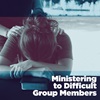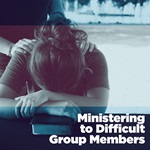Recently, I found myself in a medical crisis. I was battling a severe upper respiratory infection, so my doctor ordered a head and chest x-ray to look into the issue. With hesitancy, the doctor said he wanted to show me something on the film. He'd found a lung nodule and wanted to check it out further with a CT scan. I lost both of my parents to lung cancer, so the news sent me spinning.
Four days later at my CT scan I got both good and bad news. The lung nodule was simply a scar—nothing to worry about. But the scan had found something else: a grapefruit-sized mass on my liver. It could be a simple hemangioma—a collection of blood vessels that was harmless—or something much more serious. Only a more detailed scan of my liver could tell us. When I heard the news, I was overwhelmed. But the worst part came when my friends started offering "encouraging" words. Innocently, they said a lot of things that actually made the situation more difficult. What was meant to comfort did just the opposite.
As small-group leaders, it's crucial that we know how to effectively speak to people in crisis. Our words have a lot of power. In an effort to bring comfort and encouragement, though, we often offer clichés and pat answers that actually make things worse. Here are four common responses that are unhelpful to people in the midst of crisis:
Don't worry! God's got this!
Yes, God is in control. But for the person going through the crisis, this message can be like venom. Although God has called us to place our burdens at his feet, telling people in crisis not to worry doesn't solve the issue. Plus, it can make them feel like they must be lacking in faith because they are worrying. This simply is not the case; it's just the reality of being human.
Rather than make our group members in crisis feel guilty, it's better simply to acknowledge their worry, fear, or hurt. Make it safe to talk through what they're feeling, and they'll experience a lot more calm and peace than if you'd simply tell them to stop feeling the way they feel. Once while attending a counseling workshop, I heard a participant share a helpful sentiment: "I'm not ready to be happy." People in crisis don't want to hear everything is going to be fine. They need someone to acknowledge their current struggle and walk with them.
A more helpful response than "It's going to fine!" or "God's got this!" would be to say something like: "I'm sure you're scared and worried. Is there anything I can do for you?" Another way to say it: "I can't even begin to imagine what you're going through. What can I do to help?" These responses acknowledge the difficulty of the situation, and they let the person tell you what he or she needs.
I know exactly what you're going through.
Though we may be able to relate to what the person is going through, we haven't had the exact experience. While there is some comfort in knowing that others have struggled in similar ways, it can be painful to hear people say, "I know exactly what that feels like"—because they don't. Our situations are unique, and we need to be honest about that. Even if we've gone through very similar circumstances, our ways of handling it, our emotions, and our struggles will be different, and a response like this projects our own experiences onto others.
Worse, this kind of response can appear to be minimizing the seriousness of the situation. It may sound like: "I've gone through this before, so it's not that big of a deal. You'll make it through, too." We must find a way to acknowledge the difficulty and not make light of it with a response like this. A more helpful response is something like: "It sounds like this is really difficult" or "That sounds incredibly painful. I'm so sorry." Rather than say you know what they're going through, let them know that the group will walk through the situation with them.
I know you'll be fine.
I'll be honest: these words angered me the most. I wanted to scream at people, "Really? God already told you?" The fact is, we don't know that someone in crisis will be fine. We don't know God's purpose for this event in his or her life. We do know that God is capable of more than we can imagine—and that includes great healing. But Scripture is clear: Not everyone is healed. Not every situation is solved. Not everyone will be fine. When we say, "I know you'll be fine," we may offer false hope or make people feel like we're brushing off the seriousness of the situation.
We obviously want the person to be fine. We want their hurting to end and their ailments to be healed. But rather than say we know what will happen, it's better to walk with them in the uncertainty. One of the best responses I heard during my ordeal was: "Well, that sucks." It may seem overly simple, but this response acknowledged the pain of my situation without jumping to conclusions about what might happen in the future. Many times when someone is in crisis, we want to encourage them, but I've found it's better to simply acknowledge that the situation is bad and then sit with the person. Sometimes just being available for someone is the best encouragement.
I'm praying for your healing.
It's true that God can heal, and it's important that we pray for healing. But as we pray for healing, we must also recognize the person's needs in the meantime—and the fact that healing may never come. I've found that we often only pray for the person's healing rather than also praying for their peace, strength, courage, and hope in the midst of the situation.
Don't stop praying for healing, but also pray for their other needs, especially those that may be top of mind. What do they need emotionally? What resources are needed? Pray that they will experience God's presences in the midst of the crisis, that they'll have strength to endure, and that they would experience peace.
Thankfully, my second CT scan revealed the mass on my liver was a harmless hemangioma. Though I wouldn't choose to go through that situation again, I did learn a lot about the power of words when someone is in crisis. In an effort to bring encouragement, comfort, and reassurance, we often do a lot of damage. If we're not careful, our best intentions can actually hurt the very person we're trying to help.
—Peri Gilbert is Small Group Coordinator at The Simple Church.












